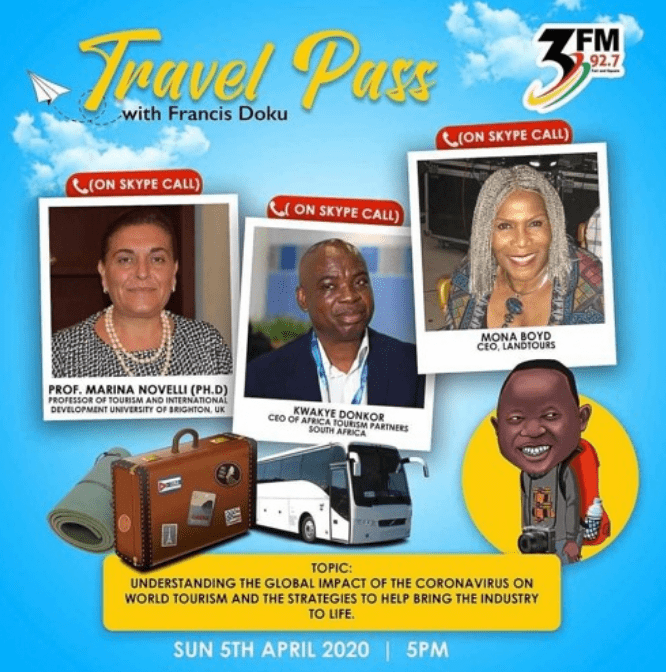
Professor Marina Novelli was invited to comment on the impact of the COVID-19 pandemic on the global tourism sector and next steps required to return to some level of normality on 3news radio live in Ghana.
Featuring on Travel Pass with Francis Doku, Professor Novelli gave her expert opinion on the likely implications, scenarios and key considerations for recovery. She reminded listeners that everyone must play their part by observing the social distancing restrictions and staying at home during the lockdown. Decisions to close borders are essential, and although inconvenient, one must remember that:
“This is not a tourism crisis, this is a humanity crisis and we should prioritise health over wealth.”
Professor Novelli acknowledged the difficulty of implementing restrictions, particularly in poorer areas where sanitation and access to water is not readily available. She highlighted the need for a multi-agency taskforce, including ministries, the private sector and third sector organisations, to collaboratively identify specific priorities and urged governments to ring-fence emergency funding to enable coordinated actions.
Although all current quantification of the problem is merely speculative, researchers are looking at ways to stimulate recovery in the short, medium and long-term spanning from six months to two years from the end of the pandemic. Professor Novelli highlighted the primary importance of containing the pandemic and also managing perceptions by responding quickly and implementing directives from the World Health Organization, and by maintaining the presence of destinations in the market place and consumer confidence in destinations’ health and safety. She referenced lessons learned following the Ebola outbreak where countries untouched by the epidemic nevertheless suffered dramatic decreases in tourist numbers – and the need to be prepared for this happening again, at a much larger scale, and taking far longer to return to previous levels.
In addition, Professor Novelli pointed out that the impact on the tourism sector would be far-reaching. For instance, there are studies which indicate that in destinations in developing countries, for every person in direct employment in tourism, there are on average seven who are dependent upon them; any impact assessment should consider this as well as individuals operating in the informal sector, who are often overlooked.
In her concluding remarks, Professor Novelli stressed the importance of the sustainability agenda and about the importance of looking at ways to preserve the resources, both built and natural, which are normally supported through revenues generated from tourism. She pointed out that it will be crucial to mitigate any adverse impact or risk losing the very assets that will attract future tourists.
The global lockdown provides us with an opportunity to rethink tourism. As an Affiliate Member of the UN World Tourism Organization (UNWTO), the University of Brighton and Professor Novelli’s message is in line with the UNWTO recommendation to #stayhometoday and #traveltomorrow.
For UNWTO information on COVID-19 and tourism, please visit the UNWTO website.
Listen to Professor Novelli’s full interview on 3news via soundcloud


